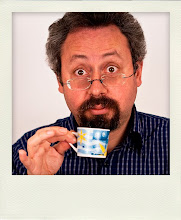The line, I guess, it's quite a fine one. Apparently, in some Roman and Medioeval celebrations a "fool" was elected Carnival King and enjoyed absolute power for a day, at the end of which he was killed. Today we live in gentler times, but I think that something of that role survives in the modern comedian. In a sense, the comedian "sacrifies" himself as a laughing stock. Ok, if he or she is a good comedian people will laugh with him and not at him, but there is also a implicit agreement going on that says: I give you, the audience, the authorisation to laugh at me, with my approval and to my own advantage, so you don't need to feel guilty about it. The pleasure that incurs is, in part, the pleasure of doing something that would normally be forbidden or frown upon but that is here exceptionally allowed. Which, I guess, is the essence of the Carnival. Probably the most extreme example is when comedians with a disability made jokes about their own condition. I'm thinking, for instance, of Liz Carr, Lawrence Clarke or my brother in open spot arms Max Turner. Laughing at accents, nationalities or ginger air can be allowed in many "normal" social conditions, but laughing at disabilities is definitively taboo. These comedians bravely allow us to do just so for the duration of their set.
So, why was I slightly upset by that reaction? After all, I have never considered my look one of my strongest assets, even if I have never targeted one-eyed women for that reason, which I guess would make sense only if I was in some way three-dimensionally challenged. I guess the reason why that episode left a bitter after-taste is that my look wasn't the subject of the routine, which was more about Italian mothers and the absurdity of the two of us speaking in English. Of course, I was consciuous of the comic potential of that specific "turn of phrase", but I wasn't really granting the audience the license to laugh at the way I look. Now I will, I'll keep that line in my set and I'll enjoy the big laugh.
In the meantime, to the girl who shouted "that's so unfair!"... drink?


You raise an interesting point, sir, as always.
ReplyDeleteBilly Connolly probably copied someone else, but I'll quote him as saying: "When you're vulnerable, you're funny". Which basically means that he who can embrace his otherness on stage and mock it becomes vulnerable = comedy gold. If you can channel the audience's nervous energy relating to age/race/looks/disability/social status and allow them to release a laugh at what they wanted to say but would never ever dare, then all the better.
It feeds into the whole thing that we had a month or so ago with the debate on whether you *had* to address your ethnicity (and God knows I've done so to get cheap laughs - guilty as charged). If we accept the above paragraph as law - do we have to obey it? I'm leaning towards attacking this particular comedy club construct. Coming soon to an open spot near you, once I grow the balls to abandon my tried-and-tested cheap ooh-lookit-the-weird-Icelander gags.
As far as audiences are concerned, let them laugh at whatever they want. If you suddenly get a group of 8'9'' Nordic War Gods that laugh and rumble at the odd-shaped Italian midget, or a 3'4'' pygmee hen night that titters about your, well, size all night, let them. We're full of discoveries about ourselves - I, for example, think myself a handsome man and therefore dislike photographs, for they tend to prove that I'm absolutely average - but whether we absolutely *have* to exploit this for laughs is a worthwhile question.
With regards
Snorri Kristjansson
Hi Snorri, nice to see that you are following! Your comments are always very interesting. You are right, let's see what the audience laugh at and this will reveal something about how we are perceived... then maybe we can challenge it.
ReplyDelete